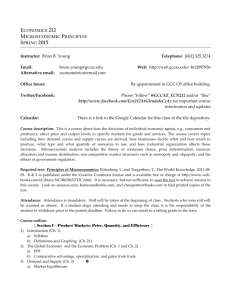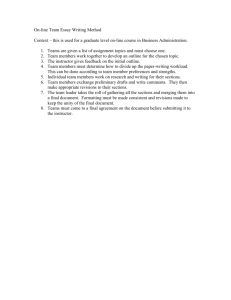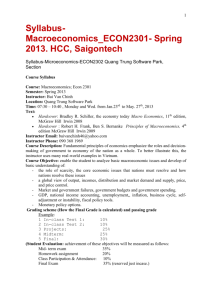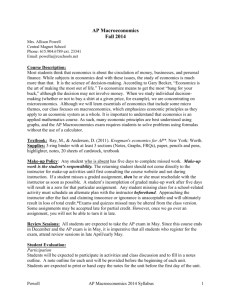ECONOMICS 211 MACROECONOMIC PRINCIPLES SPRING 2015
advertisement
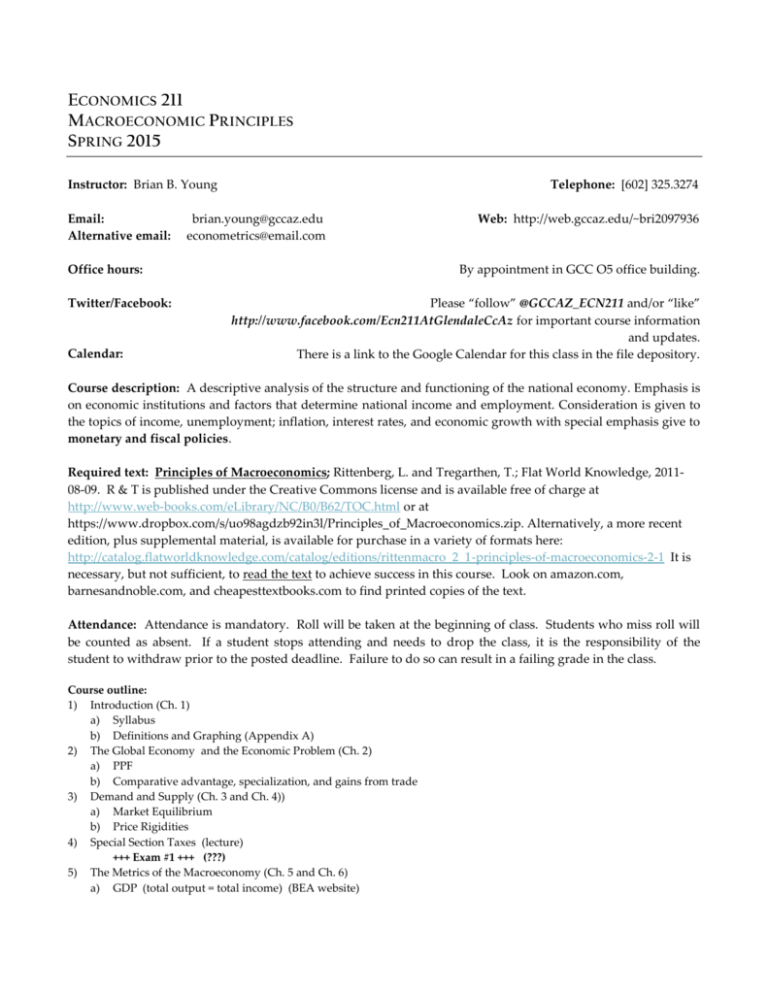
ECONOMICS 211 MACROECONOMIC PRINCIPLES SPRING 2015 Instructor: Brian B. Young Email: Alternative email: Telephone: [602] 325.3274 brian.young@gccaz.edu econometrics@email.com Office hours: Twitter/Facebook: Calendar: Web: http://web.gccaz.edu/~bri2097936 By appointment in GCC O5 office building. Please “follow” @GCCAZ_ECN211 and/or “like” http://www.facebook.com/Ecn211AtGlendaleCcAz for important course information and updates. There is a link to the Google Calendar for this class in the file depository. Course description: A descriptive analysis of the structure and functioning of the national economy. Emphasis is on economic institutions and factors that determine national income and employment. Consideration is given to the topics of income, unemployment; inflation, interest rates, and economic growth with special emphasis give to monetary and fiscal policies. Required text: Principles of Macroeconomics; Rittenberg, L. and Tregarthen, T.; Flat World Knowledge, 201108-09. R & T is published under the Creative Commons license and is available free of charge at http://www.web-books.com/eLibrary/NC/B0/B62/TOC.html or at https://www.dropbox.com/s/uo98agdzb92in3l/Principles_of_Macroeconomics.zip. Alternatively, a more recent edition, plus supplemental material, is available for purchase in a variety of formats here: http://catalog.flatworldknowledge.com/catalog/editions/rittenmacro_2_1-principles-of-macroeconomics-2-1 It is necessary, but not sufficient, to read the text to achieve success in this course. Look on amazon.com, barnesandnoble.com, and cheapesttextbooks.com to find printed copies of the text. Attendance: Attendance is mandatory. Roll will be taken at the beginning of class. Students who miss roll will be counted as absent. If a student stops attending and needs to drop the class, it is the responsibility of the student to withdraw prior to the posted deadline. Failure to do so can result in a failing grade in the class. Course outline: 1) Introduction (Ch. 1) a) Syllabus b) Definitions and Graphing (Appendix A) 2) The Global Economy and the Economic Problem (Ch. 2) a) PPF b) Comparative advantage, specialization, and gains from trade 3) Demand and Supply (Ch. 3 and Ch. 4)) a) Market Equilibrium b) Price Rigidities 4) Special Section Taxes (lecture) +++ Exam #1 +++ (???) 5) The Metrics of the Macroeconomy (Ch. 5 and Ch. 6) a) GDP (total output = total income) (BEA website) 6) b) CPI (the Price Level) (BLS website) c) The Labor Market (the Unemployment Rate and LFPR) (BLS website) Aggregate Supply – Aggregate Demand and the Business Cycle (Ch. 7) 7) Potential GDP and Economic Growth a) Classical v. Keynesian interpretations b) Economic Growth and Productivity (Ch. 8, Ch. 19, and WEF-GCR) +++ Exam #2 +++ (???) 8) The Monetary System (Ch. 9) a) The Banking System b) The Federal Reserve System i) Policy tools ii) Money creation and fractional reserve banking 9) Investment and Capital Markets (Ch. 10 and Ch. 14) a) Interest rates b) The effects of financing a deficit (Crowding out) 9) Monetary Policy and The Fed (Ch. 11) a) The dual mandate of the Fed (inflation v. unemployment) b) Monetary innovations since 2008 c) d) e) 10) 11) 12) 13) 14) Velocity and the quantity theory of money The costs of inflation Liquidity trap +++ Exam #3 +++ (???) Fiscal Policy (Ch. 12) a) The Federal Budget (deficit) b) The debate: taxation v. expenditures c) Discretionary fiscal policy d) Automatic fiscal Policy e) Taxation Consumption and Aggregate Expenditure (Ch. 13) The Phillips Curve (Ch. 16) International Trade and Finance (Ch. 15) History of Macroeconomic Thought (Ch. 17) a) Neoclassical b) Neo-Keynesian c) Monetarist +++ Exam #4 +++ (???) Course content may vary from this description to meet the needs of this particular class. Grading: Grading will be based upon points earned on four exams. There will be three exams during the semester and one final exam. Each exam, including the final, is worth 100 points. The final exam is not comprehensive. Grades will be assigned as follows: A = 360 or more points; B = 320 to 359 points; C = 265 to 319 points; D = 200 to 264 points; Failing = < 200 points. A 2-point quiz will be given each week. Attendance and class participation will be considered in borderline cases. Disclaimer: All provisions in this syllabus are subject to revision by the instructor. Such revisions, if any, will be announced in class and on Twitter/Facebook. Exams will be announced at two class periods prior to the exam date. It is the student’s responsibility to make note of all such announcements concerning syllabus revisions and assignments, and, in case of absence or tardiness, to contact the instructor to determine if any such announcements, revisions, or assignments were made while the student was absent from the class. GCC and the instructor will make reasonable accommodations for persons with documented disabilities. Students should notify the Disabled Student Resources Office and the instructor of any special needs. Disciplinary standards in this course will be maintained as per the GCC Student Handbook. Phones must be turned off during the lecture period.
